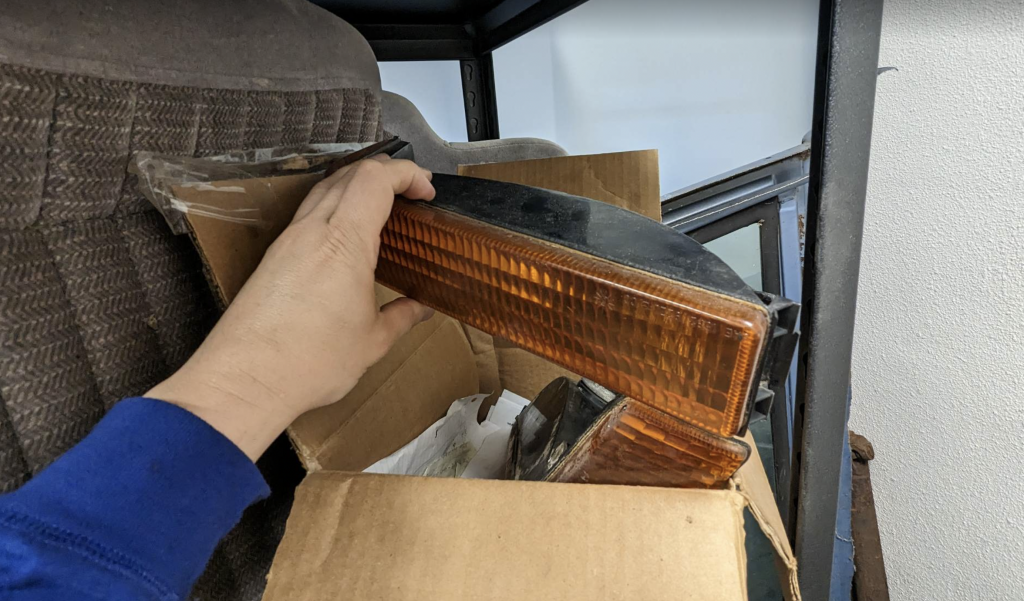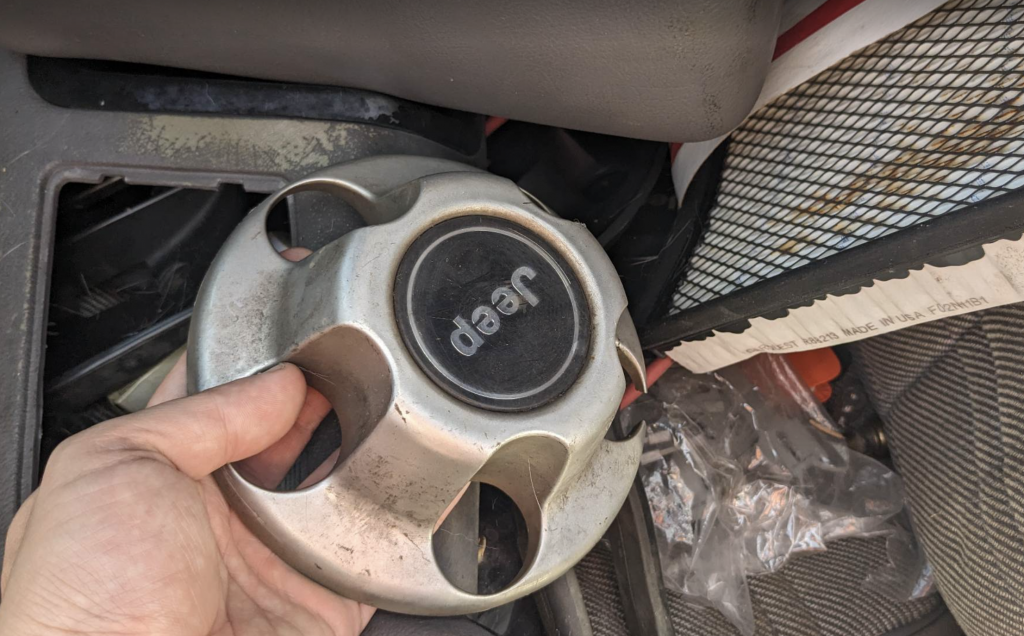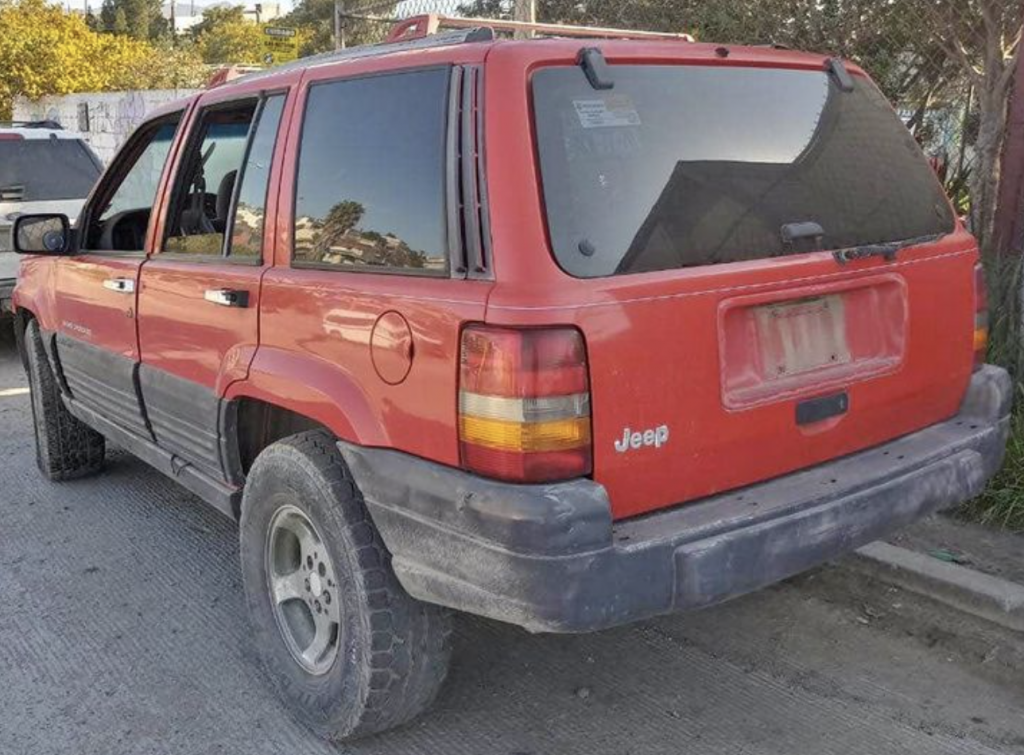“Meow!” I hear as an orange cat bounces around the interior of my hyper-rare 1994 Jeep Grand Cherokee five-speed, a vehicle that I often refer to as the “Holy Grail.” As I open a door, the cat drops out from…somewhere…and scurries away among the many other cars in the Galpin Media parking lot. The Jeep looks sad; it’s been sitting abandoned in this lot since I arrived in California a few months ago, and before that was sitting abandoned in my front yard for months. Before that, it was abandoned in my backyard, and before that it was abandoned in a field in Virginia. But fear not, oh Holy Grail, for glory awaits you, as I am amassing the greatest stockpile of factory-original parts ever assembled. Why? I’m building The Ultimate Jeep Grand Cherokee. Here’s how.
The automobile I first learned to drive was a first-generation Jeep Grand Cherokee, called the “ZJ” internally by Jeep and also externally by weirdo Jeepers like me. The vehicle played a pivotal role in my trajectory, introducing me to the off-road world, and inspiring me to dedicate some of my life to studying engineering so I could work at Jeep in Detroit, developing the next-generation of off-road machines (I was lucky enough to arrive at Chrysler in 2015, just as the JL Wrangler program began). Here’s the machine that made me the weird Jeep-man I am today:

I love the ZJ. With a stick, I think it’s the best budget-overlanding Jeep in the world, and it is without question the best-generation Jeep Grand Cherokee, which was initially meant to act as the successor to the venerable Jeep Cherokee XJ, which had been around since the 1984 model-year. But when the ZJ debuted for 1993, the XJ stuck around as the less-expensive, smaller Jeep, and the ZJ became its bigger, younger brother. The ZJ would later be succeeded by the bigger, heavier WJ, which had a spare tire well in the trunk that reduced ground clearance, plus the WJ was just a generally bulbous machine. The WJ was still a great off-road Jeep compared to the independent-suspension-equipped Jeep Grand Cherokees that would follow, but Jeep’s best Grand Cherokee was its first, and it’s the one I’m using as the basis for the Ultimate Grand Cherokee — specifically the ultimate overlanding Jeep Grand Cherokee.
My Starting Point Is The Best Grand Cherokee Model Ever

I’m starting with a “Holy Grail” Jeep Grand Cherokee, one of 1,400 Grand Cherokees ever built with a manual transmission (in the U.S., the only Grand Cherokees ever offered with a stickshift were 1993 and 1994 models). This is a big deal for a number of reasons, the most important of which is the fact that the Chrysler transmissions offered in other Grand Cherokees were known to be unreliable. Other advantages of the rare stick is the fact that it’s more fun to drive than an automatic, it’s easier to repair, and it offers another way to fire up the car should there be issues with the starter (you can roll-start the Jeep).

The video below shows me buying my very first “Holy Grail” manual transmission Jeep Grand Cherokee. Its accompanying article, and my old article about a Wisconsin man who planned to junk his rare Jeep due to rust, brought numerous “Holy Grail” Grand Cherokee owners out of the woodwork and into my email inbox. As I described in my article “Here’s How I’m Going To Save A Doomed ‘Holy Grail’ Jeep Grand Cherokee Sitting On An Old Wisconsin Dairy Farm,” a man from Virginia sold me his red one for $350 (I towed it back to Michigan, then to California), though it was missing a transmission; the aforementioned Wisconsite then sold me his rustbucket for $350, and together I had the makings of a nice, solid Holy Grail Grand Cherokee, and all for just $700.
(The one below I sold, in part because it looked terrible due to its bad paint, and also it had 260,000 miles on it, but really it’s because I knew if I didn’t save the Virginia Jeep using the rusty Jeep, they’d both end up in junkyards).
My red 1994 ZJ’s stickshift is bolted to the stout 4.0-liter AMC inline-six, which is an unstoppable engine so long as it’s kept cool. Luckily the ZJ Grand Cherokee — unlike the XJ Cherokee, YJ Wrangler, TJ Wrangler, and other legendary Jeeps — was originally designed to fit, and thus cool, a 5.2-liter V8 motor. So the radiator — which dips down to a lower cooling opening (which the aforementioned 4.0-liter Jeeps don’t have) — is enormous; ZJs do a great job at keeping their cool, as I explain in this video clip:
But my Jeep isn’t just a 4.0-liter five-speed “Holy Grail” Grand Cherokee, it’s actually a Holy Grail among Holy Grails. That’s because my manual Grand Cherokee is a base “SE” model, featuring crank windows, manual locks, manual cloth seats, and very few niceties. Jeep sold very few Grand Cherokees with manual windows and locks in 1993 and 1994, and in the model’s third year of production, it no longer offered such a basic trim.

With a stickshift and very few interior electronics, my ZJ is a truly basic machine built on an excellent platform. In fact, the platform marks the very first time a high-volume production vehicle offered a five-link coil-sprung solid axle suspension both front and rear. This later became the standard for Jeep; every Jeep Wrangler generation since the ZJ’s launch has utilized such a suspension. The ZJ’s novel rear suspension — called “Quadra-Coil” when paired with the Jeep XJ’s “Quadra-Link” front suspension — would later be adopted by the Toyota 4Runner, Mercedes G-Class, Ram 1500, and more. It’s now the standard for solid rear axle coil spring suspensions because it offers excellent ride quality, excellent off-road suspension articulation, and handling improvements over a leaf spring design.

Pair that engine, transmission, and suspension with a unibody that offers good interior space without weighing that much, and add a genuinely comfortable and quiet (but super basic) interior, and you end up with an (arguably) modern Jeep that’s reliable, comfortable, practical, and genuinely off-road capable. It’s an excellent starting point for an off-road build, but mine needs some upgrades before being a true off-road warrior and thus the ultimate Jeep Grand Cherokee. Luckily, Jeep offered lots of options on the ZJ, and they can be found in junkyards everywhere.
Turning My Base ‘Holy Grail’ Jeep Grand Cherokee Into ‘The Ultimate’
The more I look at the ZJ, the more I love it. Good size, reasonable weight, solid axles are flexy and durable, nice comfortable interior, decent ride, reliable, good visibility, and more handsome each day. (Also the fully loaded U-Haul is somehow doing 11 MPG @ 65mph!) pic.twitter.com/PFVl6GRuPl
— David Tracy (@davidntracy) February 13, 2023
To build the Ultimate Jeep Grand Cherokee basically requires starting with the best variant — the base-model manual ZJ — and then adding all the best Jeep Grand Cherokee parts that Jeep ever offered either from the factory or from the dealership through its parts company MOPAR.

One obvious improvement my ZJ could use is better seats, as the base vinyl ones (examples shown above) are really not comfortable or durable. As such, I yanked the rusty Wisconsin Laredo trim’s incredibly comfortable, durable cloth seats:



In addition, the spare tire takes up far too much room in the ZJ’s cargo area — a gripe darn-near every reviewer in the 1990s mentioned during evaluation – so I’m currently in the process of picking up a hyper-rare, dealer-installed, MOPAR spare tire carrier. Check this thing out:
 `
`
By “currently in the process” I mean I already bought half of the thing a few days ago I somehow convinced an Autopian reader named Jack to drive with me 90 minutes from LA to an impound lot in Fontana so we could wrench on this spare tire carrier in the dark. Here are two photos I took of the sketchy impound lot:


Sadly, I didn’t have the right tools or the energy to get the main swinging tire carrier, but I did get the hatch-mounted latch. In fact, I got the whole hatch!:

I also managed to snag a set of factory mud flaps from a Michigan junkyard prior to my departure. Plus, I found a gray grille, which is what should be on all base ZJs (someone painted mine black). The grille is in excellent shape, and the mud flaps aren’t bad, either:
Update: Also snagged a mint grille! pic.twitter.com/3bMp4pgvsE
— David Tracy (@davidntracy) December 18, 2022
(Small aside: That gray grille is super rare. You can either get it on a base/SE trim Grand Cherokee (those are super rare) or you can find a gray high-trim ZJ whose grille is body-colored — also rare. So I got lucky finding the latter).
Then there are these amber turn signals, which I bought from eBay Kleinanzeigen while visiting my parents in Germany:

Here’s what a typical Jeep Grand Cherokee ZJ looks like with U.S.-spec turn signal lenses (this is my old base trim, which you’ll notice has the gray factory-color grille):

And here’s the Euro-spec look with those amazing amber turn signals:

Plus, I’m throwing on the factory fuel tank skid plate to protect the undercarriage:

And I have a factory transfer case skid plate that I snagged from a junkyard near Ann Arbor:






If you’re looking at those pictures wondering where the transfer case skid plate is in all that mess, then that makes you and me both. But I can tell you there’s a nice set of slotted rotors that I found at a junkyard; they were basically brand new when I removed them (these aren’t original rotors, of course):

Plus, during my junkyard visits, I have been hoarding a bunch of center caps for my steel wheels:

And I found a spare steel wheel (those were painted black) on Facebook Marketplace about a year back. These are rather rare:

And of course I plan to bolt up a later-model-year hatch, because it features a pop-out rear window. I’m going to want that fresh air when I’m camping:

So there you have it: I’ve bought the best Jeep Grand Cherokee ever — a rare base-model, stickshift ZJ — and now I’m adding a super-rare rear spare tire carrier, amber turn signal lenses offered in foreign markets, excellent Laredo seats, mud flaps, a glass-poppingly-good rear hatch, and skid plates. Plus I’m replacing all the broken interior trim, the grille (with the nice gray junkyard one), the faded bumper covers, and more. I’ll repaint my wheels silver, install the center caps I found in the junkyard, and in the end I will truly have the greatest, OEM-parts-only Jeep Grand Cherokee of all time.

I plan to then increase its off-road capability a bit by installing a small lift kit and some larger tires, and possibly a different set of axles (a stronger Dana 44 rear with a limited slip diff (maybe a locker at some point) and shorter gearing to accommodate those bigger tires; and a standard Dana 30 front with the same gearing). I also have a snorkel and a winch, though I need to decide if I want to install those. If I do, it will be before a major off-road expedition, and not just for the heck of it.
I have a lot of work ahead, as should be obvious looking at that parts-shed-disguised-as-a-Jeep, which is currently occupied by a cute cat. But I have all the parts I need and some. It’s time to get working on the Ultimate Grand Cherokee.

- The Red Bull F1 Team, Rivian, Me: Who Made The Biggest Boneheaded Car-Mistake?
- General Motors Figured Out How To Make A Great Diesel Car Engine Just To Kill It Too Soon
- The Future Of The Auto Industry Is Electric, With A Gasoline Backup
- I’m Attending My First Ever Formula 1 Race And I Have No Idea What To Expect


After I read this article, I of course started looking for a manual ZJ. And, I believe I found one! I don’t know a lot about Jeep Cherokees, but it’s a manual, and it has the Laredo trim? It’s in Europe though, if that changes anything.
I can’t wait to read about this! One question – will the rear window open with the tire carrier installed?
David are you wearing a Boys State Kansas shirt?
Echoing what many others have said I am pumped for this build. I think it will be perfect to drive around the Americas and get some amazing content along the way. Hopefully Mercedes can help you kit out the interior for overlanding.
I’m so happy for DT. This is like a treat yourself project. It’s not about just getting something to limp along. It’s about making something special tailored to his needs and desires. This is DT2.0!
Newly relocated to California after abandoning a superfund site of a house in Michigan, the hoarding shall resume.
Very curious to see this project carried out, it’s at least not the same swiss cheese starting base we are used to. Love the angle you’re approaching this project with, getting original factory options on a simple and reliable base model. Refreshing to see someone trying to get the best out of their rig with OEM equipment before hacking everything up !
This is vintage DT in his element!
Press on regardless!
Be sure to replace the shitty US headlamps with ECE headlamps while you’re at it.